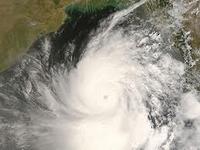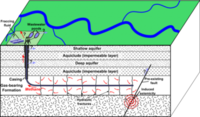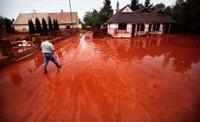-
Hurricanes which pass over fresh water can be stronger

About 60 percent of the world’s population resides in areas that are prone to hurricanes or cyclones; researchers find that if a hurricane’s path carries it over large areas of fresh water, it will potentially intensify 50 percent faster than those that do not pass over such regions, meaning it has greater potential to become a stronger storm and be more devastating
-
-
Earthquake risks in Europe

How strong can earthquakes in Germany be? Where in Europe are the earthquake activities concentrated? These questions are the basis for risk assessments and become relevant when it comes to the safety of buildings or the generation of tsunami; a new Earthquake Catalogue for Europe and the Mediterranean, which offers details of 45,000 earthquakes during the last millennium, suggests answers to these questions
-
-
Climatic impacts of megapolitan expansion
Arizona’s Sun Corridor is the most rapidly-growing megapolitan area in the United States. Nestled in a semi-arid environment, it is composed of four metropolitan areas: Phoenix, Tucson, Prescott, and Nogales. With a population projection expected to exceed 9 million people by 2040; a first study of its kind, attempting to quantify the impact of rapidly expanding megapolitan areas on regional climate, showed that local maximum summertime warming resulting from projected expansion of the urban Sun Corridor could approach 4 degrees Celsius
-
-
Wastewater key to addressing growing global water shortage

Parched cities and regions across the globe are using sewage effluent and other wastewater in creative ways to augment drinking water, but four billion people still do not have adequate supplies, and that number will rise in coming decades
-
-
Water sustainability flows through complex human-nature interactions
The fate of water in China mirrors problems across the world: water is fouled, pushed far from its natural origins, squandered, and exploited; China’s crisis is daunting, though not unique: two-thirds of China’s 669 cities have water shortages, more than 40 percent of its rivers are severely polluted, 80 percent of its lakes suffer from eutrophication — an over abundance of nutrients — and about 300 million rural residents lack access to safe drinking water
-
-
World facing increasingly challenging water situation
New measure developed for sustainability of global groundwater water supply points to overuse of water in Asia and North America; approximately 1.7 billion people, most residing in Asia, live in areas where groundwater resources or groundwater-dependent ecosystems are under threat
-
-
July flooding in China causes $8.3 billion of economic losses

Insurance industry faces agriculture losses from China to the United States in July 2012: flooding caused more than $8.3 billion in economic losses across China during July, while the worst drought in decades worsened across much of the United States; severe weather also prompted widespread damage in parts of the United States and Europe
-
-
Improved disaster resilience is imperative for U.S: report
A new report from the National Academies says that it is essential for the United States to bolster resilience to natural and human-caused disasters, and that this will require complementary federal policies and locally driven actions that center on a national vision – a culture of resilience; improving resilience should be seen as a long-term process, but it can be coordinated around measurable short-term goals that will allow communities better to prepare and plan for, withstand, recover from, and adapt to adverse events
-
-
Extreme summer heat events, global warming linked: research

Since the late 1980s researches have been asserting that global warming would reach a point in the coming decades when its connection to extreme events would become more apparent; while some warming should coincide with a noticeable boost in extreme events, the natural variability in climate and weather can be so large as to disguise the trend; to distinguish the trend from natural variability, NASA researchers turned to statistics; the researchers did not focus on the causes of temperature change, analyzing instead surface temperature data
-
-
Study finds correlation between injection wells and small earthquakes

Most earthquakes in the Barnett Shale region of North Texas occur within a few miles of one or more injection wells used to dispose of wastes associated with petroleum production such as hydraulic fracturing fluids, according to new research
-
-
Study finds substantial water pollution risks from fracking

The Marcellus Shale region covers approximately 124,000 square kilometers from New York to West Virginia and is being intensely developed; a new study finds that the disposal of contaminated wastewater from hydraulic fracturing — commonly known as fracking — wells producing natural gas in the Marcellus Shale region poses substantial potential risks of river and other water pollution
-
-
Canadian company offers the first treatment to neutralize red mud

Red mud is the most significant waste product of the traditional Bayer process for aluminum production; the industry produces more than 100 million tons of red mud a year, of which less than 5 percent is be reused; the rest is stored in ponds and reservoirs, posing serious environmental and economic risk; on 4 October 2010, for example, a flood of toxic red mud devastated Hungary after a retaining dyke ruptured, causing an ecological disaster; Canadian company Orbite Aluminae offers a technology to tackle the aluminum industry’s most serious problem
-
-
Critics charge DHS chemical plant security program a failure
In 2006 Congress passed the Chemical Facility Anti-Terrorism Standards program, or CFATS, which set security standards chemical plants had to meet; there are 4,400 chemical plants covered by CFATS, of which 120 are considered especially dangerous, as a chemical release– accidental or as a result of a terrorist act — in any one of them would cause hundreds of thousands of casualties; after four-and-half years and $480 millions spent on CFATS, not a single plant of the 4,400 had been fully inspected; of the 120 riskiest plants, 11 had a preliminary inspection done; not a single site security plan has been approved
-
-
Forget blizzards and hurricanes, heat waves are deadliest

Tornadoes, blizzards, and hurricanes get most of our attention because their destructive power makes for imagery the media cannot ignore; for sheer killing power, however, heat waves do in far more people than even the most devastating hurricane; Hurricane Katrina and its floods, which devastated New Orleans and the Gulf Coast in 2005, exacted a death toll of 1,836 people; the heat wave which enveloped Europe during the course of three excruciating weeks in August 2003 of that year, killed an estimated 70,000 people
-
-
Identifying potential pre-quake signals
Changes in seismic velocity — changes in the speeds at which seismic waves move through the Earth’s crust — have been identified during and after many earthquakes; do these changes also happen before an earthquake, and could they be measured as a way to predict a quake on the way?
-
More headlines
The long view
The Surprising Reasons Floods and Other Disasters Are Deadlier at Night
It’s not just that it’s dark and people are asleep. Urban sprawl, confirmation bias, and other factors can play a role.
Why Flash Flood Warnings Will Continue to Go Unheeded
Experts say local education and community support are key to conveying risk.
